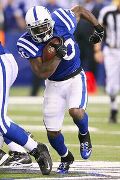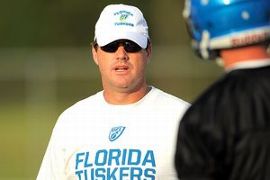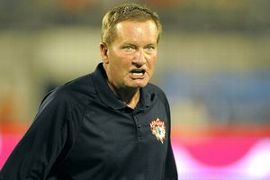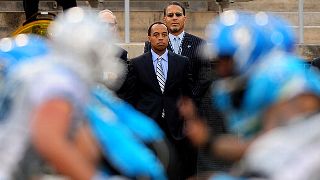Michael Huyghue, the commissioner of the United Football League, seemed to be in high spirits last week.
"I'm excited about this [2011] season," he said brightly.
Huyghue sighed for a moment and then, with slightly less enthusiasm, said, "There is."
When your league loses $32 million in its first season, nearly $50 million in the second and creditors line up looking for $5 million in unpaid bills, these questions come up. When one of your most visible investors -- Dallas Mavericks owner Mark Cuban -- sues to get his $5 million loan back, there will be skepticism. In fact, last week, Huyghue's Wikipedia entry described him as the "former commissioner" of the UFL.
Some might see a grim foreshadowing here, but a league spokesman said someone had probably hacked the online encyclopedia; Huyghue's title has been restored. The league acknowledges that there were discussions about folding, but when some of those bills started to get paid, it was clear the UFL was moving forward.
"People never thought we could launch or play in the fall," Huyghue mused, "or get good players, that there'd be no space on TV for us. Reports of our death are greatly exaggerated."
Channeling Mark Twain is never a bad play, but if the UFL's third season isn't more cost-effective, the league could go the way of its predecessors -- the USFL, XFL, NFL Europe, World Football League and the All-American Football Conference.
The UFL once envisioned having six or eight teams playing 10 regular-season games in 2011, but with the morphing of the Florida Tuskers into the Virginia Destroyers, there again will be five teams -- in Hartford, Las Vegas, Omaha, Sacramento and Virginia Beach -- playing an eight-game schedule.
The chief difference this year is the kickoff date. The UFL has shrewdly moved up its games one month, to the weekend of Aug. 7. Which begs the question:
Could an NFL lockout save this thing? Would a protracted struggle over that league's $9 billion in revenue open a window?
"It's not part of the strategy," Huyghue insisted. "
You can't plan on it, but you can position yourself.
"If this happens, if people turn off to the billionaires-versus-millionaires argument, that creates an opportunity for a league like ours. It could benefit us incredibly."
Huyghue acknowledged the league's losses but said its investors never envisioned making money in the first three years of operation, especially without a major television deal. He said regardless of whether an NFL lockout leads to a new television contract and unprecedented exposure, this is not a make-or-break season for the UFL.
"Sometimes things get overdramatized," Huyghue said. "We have $115 million invested in the league, with $5 million owed. In the grand scheme of things, these debts are not as big a number as people think.
The health of our owners hasn't changed.
"We just have to continue to keep grinding and keep playing football."
A welcome opportunity
Dominic Rhodes had played nine NFL seasons, but it took only one road trip to discover he wasn't in the NFL anymore.

"We were flying from Florida to play the Las Vegas Locos," the running back said. "Pretty simple, right? Well, we stopped in Louisiana for gas. I flew to games in high school in Texas, but we never stopped for gas.
"There's no meal money -- you eat what the team eats, or you pay your own way. We had to have roommates, on the road and at the hotel in Orlando. I got my own room -- I mean, I'm too old for that."
Rhodes, who turned 32 in January, is quick to say that his brief UFL experience was a positive one. After seven seasons with the Indianapolis Colts, one with the Raiders and another in Buffalo, he was unemployed last year. Tuskers coach Jay Gruden offered him a job, and Rhodes responded with 547 rushing yards and 10 touchdowns -- one of them a catch from Brooks Bollinger, a veteran of three NFL teams -- in eight games.
The Colts were impressed -- and injured -- enough to sign Rhodes in December. He returned for his third tour of duty in Indianapolis and provided a serviceable 37 carries for 172 yards.
In two years, the UFL has sent more than 100 players to the NFL, including those who have signed futures contracts. Proving that less is Moore, the Tuskers' Eric Moore was picked up by the Patriots and started at outside linebacker in their divisional playoff game against the Jets, and Las Vegas linebacker Brandon Moore played down the stretch for the Chargers. The Jets recently signed Nick Novak, the UFL's special teams player of the year, to a futures deal. Novak, who scored a league-high 69 points and made 15 of 18 field goals (one of them a league-record 54 yards), will push Nick Folk for the starting job.
"I loved the [UFL] experience," Rhodes said. "It was something I needed and definitely appreciated. It's humbling, but the guys down there want to play football. I'd go back again -- if I have to. I'm hoping to go back to the Colts. In the meantime, I'm just working hard, staying ready for whoever calls my name."
Back to the future
The Gruden brothers were together for seven seasons in Tampa Bay before the ax fell in 2008.

"We were ousted -- two brothers, two jobs -- with one decision," Jay Gruden said. "That's football."
Jon Gruden, who was the Buccaneers' coach, found work as an analyst for ESPN's "Monday Night Football." Jay, an offensive assistant under Jon, accepted an offer from Jim Haslett to be the Tuskers' offensive coordinator.
"The UFL helped a lot -- especially when I didn't have a job," Jay Gruden said, laughing. "I was skeptical of the new league. I mean, jeez-to-Pete, here we go again with Arena football."
Last month, Jay Gruden was hired by Marvin Lewis to be the Cincinnati Bengals' offensive coordinator. Chris Palmer, who coached the Hartford Colonials last season, has the same title with the Tennessee Titans.
"Jim Fassel [Las Vegas' coach] had the same opportunity," said Huyghue. "That speaks volumes about our league. The NFL will always go get the best that's out there."
Gruden, who now will wrestle with the issue of quarterback Carson Palmer's unhappiness in Cincinnati, credits the UFL with helping him get his best-ever job in the NFL and wishes his former employer the best.
"The UFL is going to have to swallow that bitter pill for the next four, five years," Gruden said. "I hope they can do it, but I think the pill is bigger than they thought."
Moving forward
Fassel was already the general manager and head coach of the Las Vegas Locomotives but, after winning the league's first two championships, he finds himself wearing another hat.
"Hey, I'm the president, too," he said. "No pay raise, but I've got a lot of titles.
"One of the major moves we made this year is that we're going to be far more independent from the league. We all admit it; we've fallen short in the marketing of it. I've hired a marketing guy and we're already making tremendous strides."
Fassel, who oversees a full-time staff of 15 or so, raves about the talent level, saying it's better than any of the other failed leagues. Twenty-four of his players have signed with the NFL. In the absence of major television money -- the UFL actually paid the production costs for Versus and Cuban's HDNet to televise its games -- the Locos need to draw more sponsors and fans to the games. Attendance at Sam Boyd Stadium averaged around 10,000.
In an effort to increase revenue last season, the UFL demanded a $150,000 transfer fee from the NFL for each of its players, but when the NFL balked, it was forced to reduce that to $25,000.

"We were reaching too high," Fassel acknowledged. "But this isn't money-grubbing; it's business. We're incurring the expense of developing a player, and in my opinion we should get some compensation.
"We're not aiming to compete with the NFL, but we can certainly coexist. We're actually good for the NFL."
Ultimately, the UFL's best chance for survival might be to serve as a developmental league for the NFL. For now, Fassel has his three hats strapped on as he wades into the Las Vegas market, looking for more sponsors and fans.
"I had a chance to go back [to the NFL]," he said. "But I love this job. We're catching up with our bills. We're moving forward."
Timing is everything
The collective bargaining agreement between the NFL and its players was set to expire Thursday at midnight, but the two sides agreed to extend the deadline. Despite the presence of many league owners at the recent mediation sessions, the parties were reportedly at least $750 million apart on how to divide annual revenue.
The dispute could go on a while.
"This WILL go into September," a prominent agent said last week in a text to ESPN's Adam Schefter.
Huyghue, 49, is in a unique position to assess the conflict. Not only is his current position outside the fray, but he has been on both sides -- several times. His first job in football was as a legal intern with the NFL Players Association. He later joined the NFL Management Council as an attorney. After spending time in the World Football league, Huyghue was a vice president with the Detroit Lions and the general manager of the Jacksonville Jaguars. His most recent enterprise before the UFL was as a player agent, when he represented, among others, Adam "Pacman" Jones.
"If I had to guess, September is the more likely time frame [for resolution] than any other," Huyghue said. "That's just enough of a window that people would know what we're about. We could attract viewers and more players. Listen, $10,000 a week is better than nothing when you need to pay for that Porsche and Mercedes."
Huyghue has done his homework. During the 24-day players' strike of 1987, the NFL kicked off three games using replacement players.
"More than 4 million viewers watched those replacement games," Huyghue said, "and our games will be better than that. If people need their dose of football, we can amply provide it."
But will one of the major networks risk offending the NFL for what is essentially a short-term summer replacement series? Conversations with programming people suggest the answer is yes.
So for now, the UFL will closely watch the labor dispute and try to clean up its financial obligations. Although the Locomotives' players have reportedly yet to receive their $20,000 shares for winning the title game -- more than three months ago -- the league says the lawsuit with Cuban has been resolved.
Huyghue uses the word "significant" in describing expected 2011 losses, but he doesn't sound like a desperate man.
"I'm happy about the fact that we're still around as a league," he said. "Our mission was to deliver NFL-caliber football to nontraditional NFL markets, and we did that.
"There's been so much anticipation for what a lockout might mean. I can't wait for it to happen, one way or another. We're still around. Just breathing has a lot to do with the chance to succeed."
Greg Garber is a senior writer for ESPN.com.

